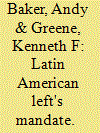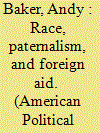| Srl | Item |
| 1 |
ID:
102707


|
|
|
| 2 |
ID:
100616


|
|
|
|
|
| Publication |
2010.
|
| Summary/Abstract |
A flurry of recent studies indicates that candidates who simply look more capable or attractive are more likely to win elections. In this article, the authors investigate whether voters' snap judgments of appearance travel across cultures and whether they influence elections in new democracies. They show unlabeled, black-and-white pictures of Mexican and Brazilian candidates' faces to subjects living in America and India, asking them which candidates would be better elected officials. Despite cultural, ethnic, and racial differences, Americans and Indians agree about which candidates are superficially appealing (correlations ranging from .70 to .87). Moreover, these superficial judgments appear to have a profound influence on Mexican and Brazilian voters, as the American and Indian judgments predict actual election returns with surprising accuracy. These effects, the results also suggest, may depend on the rules of the electoral game, with institutions exacerbating or mitigating the effects of appearance.
|
|
|
|
|
|
|
|
|
|
|
|
|
|
|
|
| 3 |
ID:
141645


|
|
|
|
|
| Summary/Abstract |
Virtually all previous studies of domestic economic redistribution find white Americans to be less enthusiastic about welfare for black recipients than for white recipients. When it comes to foreign aid and international redistribution across racial lines, I argue that prejudice manifests not in an uncharitable, resentful way but in a paternalistic way because intergroup contact is minimal and because of how the media portray black foreigners. Using two survey experiments, I show that white Americans are more favorable toward aid when cued to think of foreign poor of African descent than when cued to think of those of East European descent. This relationship is due not to the greater perceived need of black foreigners but to an underlying racial paternalism that sees them as lacking in human agency. The findings confirm accusations of aid skeptics and hold implications for understanding the roots of paternalistic practices in the foreign aid regime.
|
|
|
|
|
|
|
|
|
|
|
|
|
|
|
|